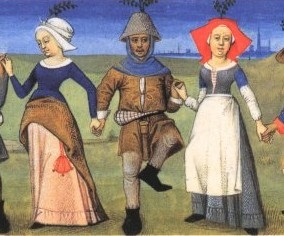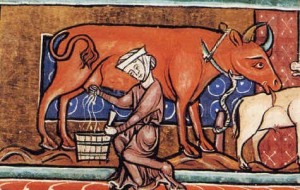from The Time Traveler’s Guide to Medieval England by Ian Mortimer:
If the limits of history are set by the questions that people (not just historians) ask about the past, then history is as wide as the public imagination. . . .
What does [the ‘living past’] reveal about us individually and collectively in relation to time? This is perhaps the most interesting aspect of the whole concept. Through it we can see ourselves collectively living for hundreds of years, and in so doing we can see ourselves change. Cast your mind back to the different standards of hygiene and justice in the fourteenth century. If we look at these aspects of life and judge them as dirty and cruel, we are really only describing our own perceptions as viewed from the modern world. There is nothing wrong in doing this, it is just very present-centered. It says more about us now than it does about us in the fourteenth century (or any other age for that matter; the past is all dirty and cruel in the modern popular imagination, with the exceptions of the Romans, who are just cruel.) However, if we start to consider medieval people as alive — the women cleaning their houses, for instance, gathering up the dirty rushes in the hall, putting new ones down, shooing the dogs outside, wiping the table, laying out the tablecloth, rinsing the wooden bowls, scouring iron and brass pans, scrubbing the family’s tunics and linen, polishing the silver spoons, and sweeping the yard — we can begin to see these people in relation to their contemporaries. Of course they are not all filthy. Many are proud of the clean state of their houses — like their modern counterparts — regardless of the judgments of people in six hundred years’ time. We may consider them excessively cruel for beating their children and dogs, but this is judging them by our standards, not their own. As we have seen, fourteenth-century parents who do not beat their children are thought to be acting irresponsibly.
In this way we can begin to appreciate the changes in almost every aspect of life, from the age structure of the population to the changing nature of the diseases we suffer. Everything changes. What does not change? Only that these people, like us, are human, and have urges, needs, and challenges, and that these are continually shifting. If we really want to understand what humanity is, and how adaptable we are, we must see ourselves as a constantly living, evolving race — always on the very cusp of a vast and unimaginable future, whether we live in the fourteenth century or the twenty-first — and in no way dead until the whitened bones of the last human being lie abandoned on the sand.
Over the course of the [fourteenth] century described in this book, more than ten million people live and die in England. Many die in infancy. Many die young. Some die twitching on the end of a rope. Some die screaming in smoke-filled rooms. Some perish in battle, many in pain and terror. Some die fighting so furiously that, in their moment of glory, they want to die heroically. Many more die alone, shivering, scared and feverish with plague. Whatever the manner of their deaths, at some point in their lives there is also some joy, be it the childhood treat of a spoonful of jam or the thrill of an illicit kiss, or seeing a grandchild. At the end of the day — at the end of the century — this is what history is. History is not just about the analysis of evidence, unrolling vellum documents or answering exam papers. It is not about judging the dead. It is about understanding the meaning of the past — to realize the whole evolving human story over centuries, not just our own lifetimes. . .

You may not agree. You may think that living for the here and now is all that matters. Or you may think that judging the past as dirty and cruel in some way establishes our superiority over our ancestors. But if you believe that we are the inheritors of a living, vibrant past, and that an understanding of what we have been is vital to an an understanding of what we are today, and what we will be in the future, then you may find yourself becoming a thoughtful time traveler, setting out on the highway of human history, guided by Chaucer down all the alleys of fourteenth-century life. You might even consider joining him and his companions in that tavern, the Tabard, in Southwark, and yourself becoming a pilgrim. At the very least you will hear some good stories.

